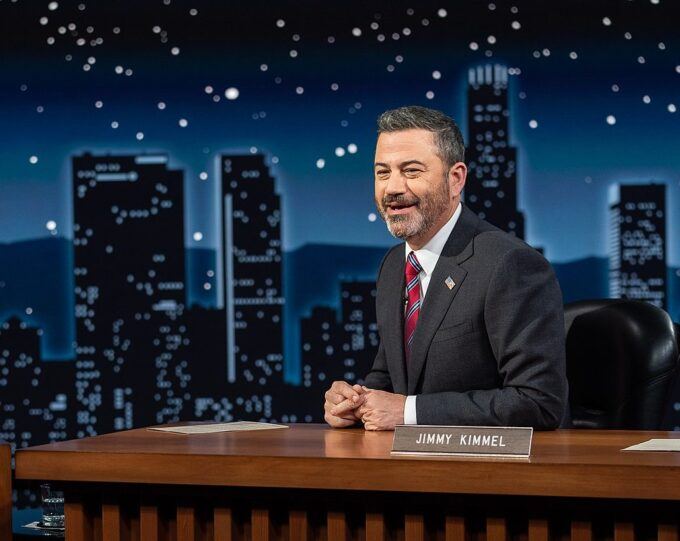
Photograph Source: Erin Scott – Public Domain
People are hailing the decision by ABC, Disney, and their corporate mascot Mickey Mouse to put Jimmy Kimmel back on the air as some grand victory for free speech. That is a fantasy. The suspension of Kimmel in the first place, along with CBS’s cancellation of The Late Show with Stephen Colbert, exposes the real story: the overwhelming grip of corporate, for-profit media on our public life. These conglomerates are not champions of the First Amendment. They are gatekeepers, deciding what we hear, what we see, and ultimately, what we think. Their decision to restore Kimmel is not proof of freedom; it is proof of how much control they wield.
The fact remains that ABC should never have suspended Kimmel. Doing so revealed the iron logic of the industry: profit first, speech second. This is hardly new. More than half a century ago, CBS cancelled The Smothers Brothers Comedy Hour because the comedians were too willing to confront Vietnam and politics head-on. The network decided controversy was bad for business, and business always wins. ABC’s punishment of Kimmel and CBS’s silencing of Colbert are not aberrations—they are part of a long tradition of corporate censorship dressed up as programming decisions.
What makes today worse is that the space for independent voices has nearly disappeared. In the 1960s, even if a major network pulled the plug, Americans still had hundreds of independent newspapers, local radio, and alternative outlets to consult. That world is gone. Local papers have been gutted, radio has been swallowed whole, and television is dominated by a handful of giants. The Telecommunications Act of 1996 and the steady erosion of antitrust enforcement opened the floodgates to consolidation. Now, iHeartMedia owns more than 870 AM and FM radio stations. Nexstar Media Group controls more than 200 television stations across 116 markets. Sinclair operates 185 stations in 85 markets. Gray Media runs another 180 stations. Even Scripps and Tegna are swept into the mix, with Tegna soon to be absorbed by Nexstar in yet another merger. The picture is one of suffocating concentration.
Even the supposed “victory” of Kimmel’s return is hollow. Both Nexstar and Sinclair have already said their ABC affiliates—nearly a quarter of the network’s reach—will not air Jimmy Kimmel Live! So much for the triumph of free speech. The reality is that a small cluster of corporations dictates the cultural conversation, and the rest of us get whatever scraps they decide are profitable enough to share.
Pull back further and the picture is even bleaker. Six corporations—Disney, Time Warner, Comcast, News Corporation, SONY, and National Amusements—control over 90 percent of the American media and entertainment markets. That includes television, film, and much of what passes for news. Americans might believe they have choices, but the reality is that a few executives, sitting in boardrooms with profit projections, decide the range of “options.” These decisions are not guided by lofty principles of free speech. They are driven by the relentless pursuit of quarterly returns. When CBS and ABC pull the plug on their late-night hosts, it is not about taste or audience sensibilities. It is about appeasing advertisers and currying favor with the Trump administration’s FCC. That is censorship in service of profit, and it is every bit as dangerous as government repression.
The same logic governs social media. Companies like Meta hide behind the banner of free speech while fine-tuning algorithms designed to maximize engagement. And what drives engagement? Outrage, extremism, and disinformation. There is no money in moderation. So Meta turns a blind eye to the poison it spreads because the poison is profitable. To call this a marketplace of ideas is laughable—it is a marketplace rigged for controversy, controlled by those who profit from division.
Meanwhile, public alternatives are vanishing. Congress has gutted funding for the Corporation for Public Broadcasting, ensuring that independent and noncommercial voices cannot survive. The airwaves, once treated as a public trust, are now corporate property. The diversity of voices that once offered Americans real choice has been suffocated under mergers, acquisitions, and endless “synergies.”
Anyone who believes the only threat to free speech comes from government is naïve. Corporate America is the bigger danger. And when a corporate stranglehold on media combines with the heavy hand of a reactionary government, the result is not a free society but a breeding ground for authoritarianism. The reinstatement of Jimmy Kimmel is not a victory—it is a reminder that freedom of speech in America survives only when it is convenient for the corporations that own the platforms.
The public sphere once held space for dissent, independent voices, and actual diversity of thought. Now it has been reduced to what six corporations decide will sell. To call Kimmel’s return a triumph is to mistake the tightening grip of corporate control for liberation. It is proof not of the strength of the First Amendment, but of its erosion. What we face is corporate totalitarianism in disguise—a system where boardrooms, not politicians, dictate the boundaries of free expression. Until that power is broken, there will be no real victories for free speech—only illusions.
The post Why Putting Jimmy Kimmel Back on the Air is not a Victory for Free Speech appeared first on CounterPunch.org.
From CounterPunch.org via this RSS feed


